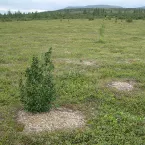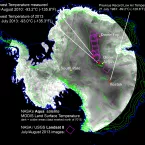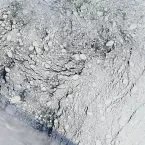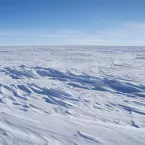Our Research
As climate changes, how do Earth's frozen areas affect our planet and impact society?
In this section
Related News & Stories
Filter by:

Spotlight
If you live in, work in, or study the Arctic, you may have noted firsthand the evidence of warming felt more strongly there than in most other places on Earth. Arctic amplification is the outsized warming in the Arctic, and climate scientists predicted this change as global atmospheric carbon dioxide concentrations rise.

Feature Story
NSIDC scientists recently recorded the lowest temperatures on Earth at a desolate and remote ice plateau in East Antarctica, trumping a record set in 1983 and uncovering a new puzzle about the ice-covered continent.

Feature Story
What’s the use of data that is difficult to retrieve? The Semantic Sea Ice Interoperability Initiative (SSIII), a project at NSIDC, tries to tackle the challenge of organizing data within language systems.


